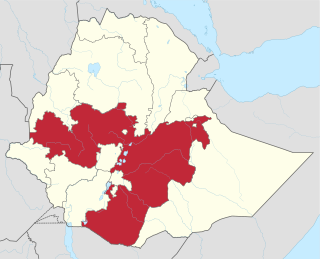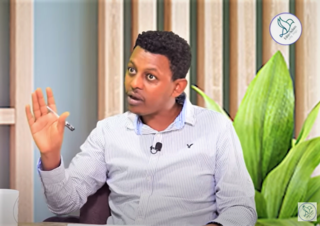
Oromia is a regional state in Ethiopia and the homeland of the Oromo people. Under Article 49 of Ethiopian Constitution, the capital of Oromia is Addis Ababa, also called Finfinne. The provision of the article maintains special interest of Oromia by utilizing social services and natural resources of Addis Ababa.

The Oromo Liberation Front is an Oromo nationalist political party formed in 1973 to promote self-determination for the Oromo people inhabiting today's Oromia Region and Oromia Zone in the Amhara Region of Ethiopia. The OLF has offices in Addis Ababa, Washington, D.C., and Berlin, from which it operates radio stations that broadcast in Amharic and Oromo.

The Ethiopian Broadcasting Corporation, now rebranded as ETV, is an Ethiopian government-owned public service broadcaster. It is headquartered in Addis Ababa, Ethiopia, and is the country's oldest and largest broadcaster.

The Oromo conflict or Oromia conflict is a protracted conflict between the Oromo Liberation Front (OLF) and the Ethiopian government. The Oromo Liberation Front formed to fight the Ethiopian Empire to liberate the Oromo people and establish an independent state of Oromia. The conflict began in 1973, when Oromo nationalists established the OLF and its armed wing, the Oromo Liberation Army (OLA). These groups formed in response to prejudice against the Oromo people during the Haile Selassie and Derg era, when their language was banned from public administration, courts, church and schools, and the stereotype of Oromo people as a hindrance to expanding Ethiopian national identity.

Lemma Megersa is an Ethiopian politician who served as the Minister of Defense from 2019 to 2020. He was also the president of the Oromia Region and deputy chairman of the ruling party in the region, the Oromo Democratic Party. Since the formation of the Prosperity Party, Lemma has been independent.
The Oromo–Somali clashes flared up in December 2016 following territorial disputes between Oromia region and Somali region's Government in Ethiopia. Hundreds of people were killed and more than 1.5 million people fled their homes. The conflict ended in 2018.

Abiy Ahmed Ali is an Ethiopian politician who is the current Prime Minister of Ethiopia since 2018 and the leader of the Prosperity Party since 2019. He was awarded the 2019 Nobel Peace Prize "for his efforts to achieve peace and international cooperation, and in particular for his decisive initiative to resolve the border conflict with neighbouring Eritrea". Abiy served as the third chairman of the Ethiopian People's Revolutionary Democratic Front (EPRDF) that governed Ethiopia for 28 years and the first person of Oromo descent to hold that position. Abiy is a member of the Ethiopian parliament, and was a member of the Oromo Democratic Party (ODP), one of the then four coalition parties of the EPRDF, until its rule ceased in 2019 and he formed his own party, the Prosperity Party.

Jawar Mohammed is an Ethiopian political analyst and activist. One of the founders of the Oromia Media Network (OMN), Jawar was a leading organizer of the 2014–2016 Oromo protests. He has been credited with toppling the incumbent government in February 2018 and bringing Abiy Ahmed to power.

Dimtsi Weyane is an Ethiopian news-based television and radio network headquartered in Mekelle, Tigray, Ethiopia. Owned by Dimtsi Weyane Tigray P.L.C., it first launched as a radio station in 1980 and in 2018 launched a satellite television channel. The channel broadcasts programming mainly in Tigrinya with some programming in Amharic, Oromo and English.

The 2021 Ethiopian general election to elect members of the House of Peoples' Representatives was held on 21 June 2021 and 30 September 2021. Regional elections were also held on those dates.

Shimelis Abdisa is an Ethiopian politician serving as the president of the Oromia Region since 18 April 2019. He is also Chief Staff of the Prime Minister since 2018.

Hachalu Hundessa was an Ethiopian singer, songwriter, and civil rights activist. Hachalu played a significant role in the 2014–2016 Oromo protests that led to Abiy Ahmed taking charge of the Oromo Democratic Party and Ethiopian People's Revolutionary Democratic Front, and subsequently becoming prime minister of Ethiopia in 2018.

The Hachalu Hundessa riots were a series of civil unrest that occurred in the Oromia Region of Ethiopia, more specifically in the hot spot of Addis Ababa, Shashamene and Ambo following the killing of the Oromo musician Hachalu Hundessa on 29 June 2020. The riots lead to the deaths of at least 239 people according to initial police reports. Peaceful protests against Hachalu's killing have been held by Oromos abroad as well. The Ethiopian Human Rights Commission (EHRC) found in its 1 January 2021 full report that part of the killings were a crime against humanity, with deliberate, widespread systematic killing of civilians by organised groups. The EHRC counted 123 deaths, 76 of which it attributed to security forces.

The Oromia Media Network (OMN) is an Oromo news channel headquartered in Minneapolis, Minnesota, U.S.. OMN is established as a non-profit independent media outlet 501(c)(3) organization, licensed under the Federal Communications Commission funded by public donors from the broader Oromo diaspora.
On 2 November 2020, allegedly a group of up to 60 gunmen attacked a schoolyard in the village of Gawa Qanqa in the Guliso District of West Welega Zone in the Oromia Region of Ethiopia, killing 32-54 people. The state-run Ethiopian Human Rights Commission said the attack had targeted people of the Amhara ethnic group. 200 people were gathered by an armed group for a meeting and then were shot at by the armed group. Soldiers had reportedly left the area hours before the attack. The Oromia Regional Government blamed the Oromo Liberation Army for the attack, who denied responsibility. Prime Minister Abiy Ahmed denounced the attack and promised a thorough investigation. Ethnic violence has increased since he took office.
Awol Kasim Allo is an Ethiopian academic, author and lecturer who started teaching law at University of Keele in 2016.

Abiy Ahmed is currently the third serving Prime Minister of Ethiopia. In 2018, he became the first ever Oromo descent to assume the role of prime minister in the history of Ethiopia. He won the Nobel Peace Prize in his second year as a prime minister of Ethiopia in 2019 becoming the eighth African laureates to win the award for peace.
The 1995 Ethiopian Federal Constitution formalizes an ethnic federalism law aimed at undermining long-standing ethnic imperial rule, reducing ethnic tensions, promoting regional autonomy, and upholding unqualified rights to self-determination and secession in a state with more than 80 different ethnic groups. But the constitution is divisive, both among Ethiopian nationalists who believe it undermines centralized authority and fuels interethnic conflict, and among ethnic federalists who fear that the development of its vague components could lead to authoritarian centralization or even the maintenance of minority ethnic hegemony. Parliamentary elections since 1995 have taken place every five years since enactment. All but one of these have resulted in government by members of the Ethiopian People's Revolutionary Democratic Front (EPRDF) political coalition, under three prime ministers. The EPRDF was under the effective control of the Tigray People's Liberation Front (TPLF), which represents a small ethnic minority. In 2019 the EPRDF, under Abiy, was dissolved and he inaugurated the pan-ethnic Prosperity Party which won the 2021 Ethiopian Election, returning him as prime minister. But both political entities were different kinds of responses to the ongoing tension between constitutional ethnic federalism and the Ethiopian state's authority. Over the same period, and all administrations, a range of major conflicts with ethnic roots have occurred or continued, and the press and availability of information have been controlled. There has also been dramatic economic growth and liberalization, which has itself been attributed to, and used to justify, authoritarian state policy.
On 18 June 2022, the Oromo Liberation Army (OLA) was accused of massacring over 500 Amhara civilians in the Gimbi county of Oromia Region, Ethiopia. Witnesses said that the OLA intentionally targeted ethnic Amhara people. This attack is part of a series of Amhara massacres that occurred in 2022.

Political repression is a visible scenario under the leadership of Prime Minister Abiy Ahmed after 2018, characterized by severe human rights violation, restriction of press, speeches, dissents, activism and journalism that are critical to his government. Similar to TPLF-led EPRDF regime, there was a raise of censorship in the country, particularly internet shutdowns under the context of anti-terror legislation labelling them "disinformation and war narratives" since the raise of armed conflict in Ethiopia. In June 2018, Abiy unblocked 64 internet access that include blogs and news outlets.












